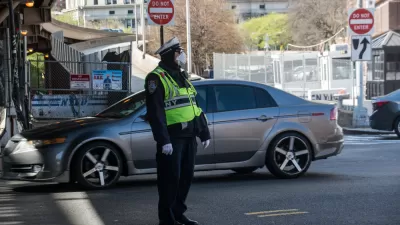East Cleveland, a struggling suburb of Cleveland, has ended up in so much fiscal distress that it is considering allowing Cleveland to annex it as a desperation move. We may need to rethink our decades of assumptions about home rule in the Northeast.

East Cleveland, a struggling suburb of Cleveland, has ended up in so much fiscal distress that it is considering allowing Cleveland to annex it as a desperation move. A fascinating article up yesterday on NextCity describes how it got to this point and the various tensions on each side about the merger idea.
On East Cleveland's side there is a proud community loathe to give up autonomy and control (not to mention a mostly-black community, some of whom told NextCity they are afraid of being subject to Cleveland's police force, which is currently under DOJ-mandated retraining as a result of its pattern of excessive use of force). And on Cleveland's side, a none-too-flush city is wondering why it (rather than the state) should bear the financial burden of helping its even more fiscally strapped neighbor, even if it would be nice not to have those issues right outside its borders.
It will be interesting to see where the idea ends up, but the proposal is striking in two ways: first, we may need to rethink our decades of assuming that home rule in the Northeast and Midwest is just too strong to allow us to overcome our fragmented tiny political bodies in favor of regional coordination. Ever since Myron Orfield and David Rusk started beating the "regional" drum, this has been the pushback. "That's great for the West, but here in the Northeast it'll never work." Never say never?
That's the optimistic angle. But Cleveland's hesitation about the annexation points to the other side of the coin:
FULL STORY: Cleveland–East Cleveland Merger Plan Overlooks Main Issue

Planetizen Federal Action Tracker
A weekly monitor of how Trump’s orders and actions are impacting planners and planning in America.

Canada vs. Kamala: Whose Liberal Housing Platform Comes Out on Top?
As Canada votes for a new Prime Minister, what can America learn from the leading liberal candidate of its neighbor to the north?

The Five Most-Changed American Cities
A ranking of population change, home values, and jobs highlights the nation’s most dynamic and most stagnant regions.

San Diego Adopts First Mobility Master Plan
The plan provides a comprehensive framework for making San Diego’s transportation network more multimodal, accessible, and sustainable.

Housing, Supportive Service Providers Brace for Federal Cuts
Organizations that provide housing assistance are tightening their purse strings and making plans for maintaining operations if federal funding dries up.

Op-Ed: Why an Effective Passenger Rail Network Needs Government Involvement
An outdated rail network that privileges freight won’t be fixed by privatizing Amtrak.
Urban Design for Planners 1: Software Tools
This six-course series explores essential urban design concepts using open source software and equips planners with the tools they need to participate fully in the urban design process.
Planning for Universal Design
Learn the tools for implementing Universal Design in planning regulations.
New York City School Construction Authority
Village of Glen Ellyn
Central Transportation Planning Staff/Boston Region MPO
Institute for Housing and Urban Development Studies (IHS)
City of Grandview
Harvard GSD Executive Education
Regional Transportation Commission of Southern Nevada
Toledo-Lucas County Plan Commissions





























